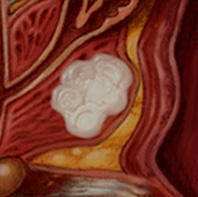
Researchers at the National Cancer Center in Tokyo, Japan studied more than 43,000 Japanese adult men who generally have a high intake of isoflavones and a low incidence of prostate cancer.
Here’s what they found.
- No association between genistein, daidzein, miso soup, and soy food intake and total prostate cancer.
- These 4 items decreased the risk of localized prostate cancer.
- But there was a positive association between isoflavones and advanced prostate cancer.
These results were strengthened when the analysis was confined to men older than 60 years where isoflavones and soy food were associated with a dose-dependent decrease in the risk of localized cancer.
How can this be?
An article in Doctors Guide says, “Once tumors lose estrogen-receptor beta expression and become aggressive, isoflavones may fail to protect against the development of advanced cancer, and might even increase the risk of progression, possibly by reducing serum testosterone.” It’s also possible that “advanced and localized prostate cancer may be different tumor subtypes, which may react differently to isoflavones.”
A comparison of local and advanced prostate cancer plus other related information can be found at the Seattle Cancer Care Alliance website.
3/23/07 21:02 JR